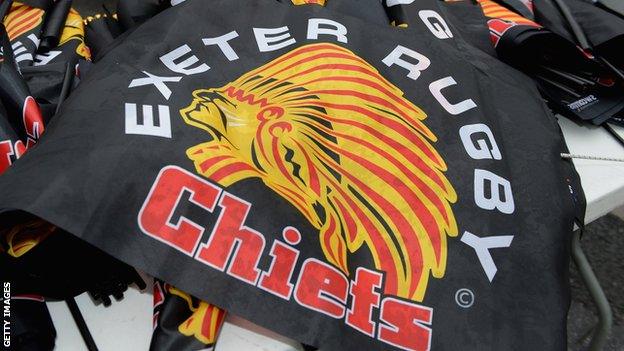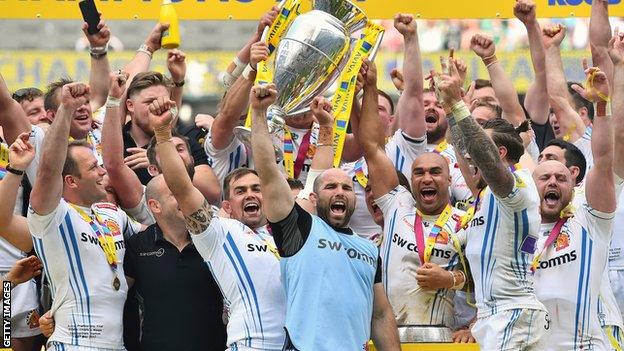Exeter Chiefs fans at odds over use of Native American branding
- Published

Exeter's rugby union club was rebranded as Exeter Chiefs in 1999
Exeter Chiefs fans are at odds over the club's Native American branding, with one group petitioning the Premiership side to "stop its racist use".
'Exeter Chiefs For Change' wants Exeter to alter their crest and address other areas of "cultural appropriation".
Its petition, which has garnered nearly 2,000 signatures, is not against the continued use of the "Chiefs" name.
Another petition, which argues the branding "honours" Native Americans, has a similar number of supporters.
When contacted by BBC Sport, Exeter Chiefs said they would not comment on the petitions.
However, it is understood that the matter is to be discussed by senior figures at the club after an open letter from 'Exeter Chiefs 4 Change' was received.
'Not surprised' by call for change
The Devon club has been in existence for 149 years, but the Chiefs moniker and a logo containing a Native American has only been officially associated with the club since 1999.
Issues around the iconography are nothing new, with one expert in Native American history urging the club in 2016 to change its name and stop "playing Indians".
Exeter, who are top of the Premiership before its provisional scheduled restart in August, has no known links to the indigenous people of North America.
Exeter fan Ian Dunstan set up the petition defending the club's branding and said he was "not surprised by the call" for change. What he aims to do is "give the many fans their chance to show how they see their team's branding".
When asked if he felt any imagery or branding used by the club was racist, he replied: "Absolutely not. How could a club with so many fans from so many cultures ever market something that was racist?
"You can see the Chiefs logo across the world. I have seen people wearing it in Kenya, Dubai and Montreal."
'There is a lot of momentum gathering'
The renewed debate comes as a number of major sports franchises in the United States have said they are considering name changes in light of recent protests against social injustice.
Last week, NFL side the Washington Redskins - a club with a moniker long perceived by some to be racist - said they would review their name after demands from major sponsors.
Major League Baseball team Cleveland Indians, who dropped their Chief Wahoo logo from their uniforms in 2019, said they would review their team name in order to "embrace their responsibility to advance social justice and equality".
Exeter supporter Ashley Green set up the petition pushing for the rugby union club to make changes and said the publicity generated by similar causes across the Atlantic had given the campaign in England a boost.
Indigenous groups both in the UK and North America have also backed the cause.
"We actually started the petition before Washington and Cleveland made announcements, but the timing is excellent for us because it shows that there is an issue the world over in sport," he said.
"There is a lot of momentum gathering, hopefully on both sides of the Atlantic, and Exeter Chiefs really can't ignore it.
"They have to do this proactively and of their own accord. We just want to be as proud of the club off the pitch as we are of the team on the pitch."

Exeter were promoted to the Premiership in 2010 and won their only title to date seven years later
'We have been on our own journeys'
Along with the image of a Native American on Exeter's badge, the group is campaigning for the club to drop its mascot, Big Chief, as well as discourage fans from performing the 'tomahawk chop' chant and wearing Native American headdresses to matches.
Green, who says he feels "uncomfortable" wearing his Chiefs shirt (which he last wore in 2017), said Exeter's historical links with Celtic tribes should instead be adopted by the club.
"Indigenous people are not mascots, this is not a culture we can appropriate for commercial gain," Green said.
"We wanted to amplify the voices of indigenous people and, as fans of the club, raise those concerns because we want our club to do the right thing.
"We don't want to force a name change, we don't think it needs to. We just think that if we shift the context with the images and iconography around that, then it can become something that is much more relevant to Exeter as a city and much easier for fans to get behind, as well as not cause offence to indigenous peoples.
"We have been on our own journeys - we have all done the tomahawk chop, all worn the shirt. What we need to do is start normalising this acceptance of changing your view and opinion based on new evidence and acknowledging stuff you did is not as palatable now as it was then.
"We are not saying to people that they are racist, we are saying that times have changed, attitudes have changed and it is time we took ownership of these things that we don't think are right and look at how we make those better and improve them from everyone."
Dunstan, who does see a Celtic chief as a "option" for the club, stressed that the club's Native American association through images, dress and chants should be seen as way to "honour and respect their cultural beliefs".
Although, he does add that the use of the club's mascot could be reconsidered.
"If you have ever sung the national anthem in a stadium and had that feeling of unity and pride, that what the chant is," Dunstan said. "It rolls around stadiums and can be clearly heard on TV.
"I see it [the club's crest] as an image that shows strength and honour.
"Headdresses were given to the leaders and most influential warriors. They show pride and allegiance for others to respect their achievements.
"But could the use of Big Chief using a tomahawk be reviewed in the current culture? Possibly, yes."